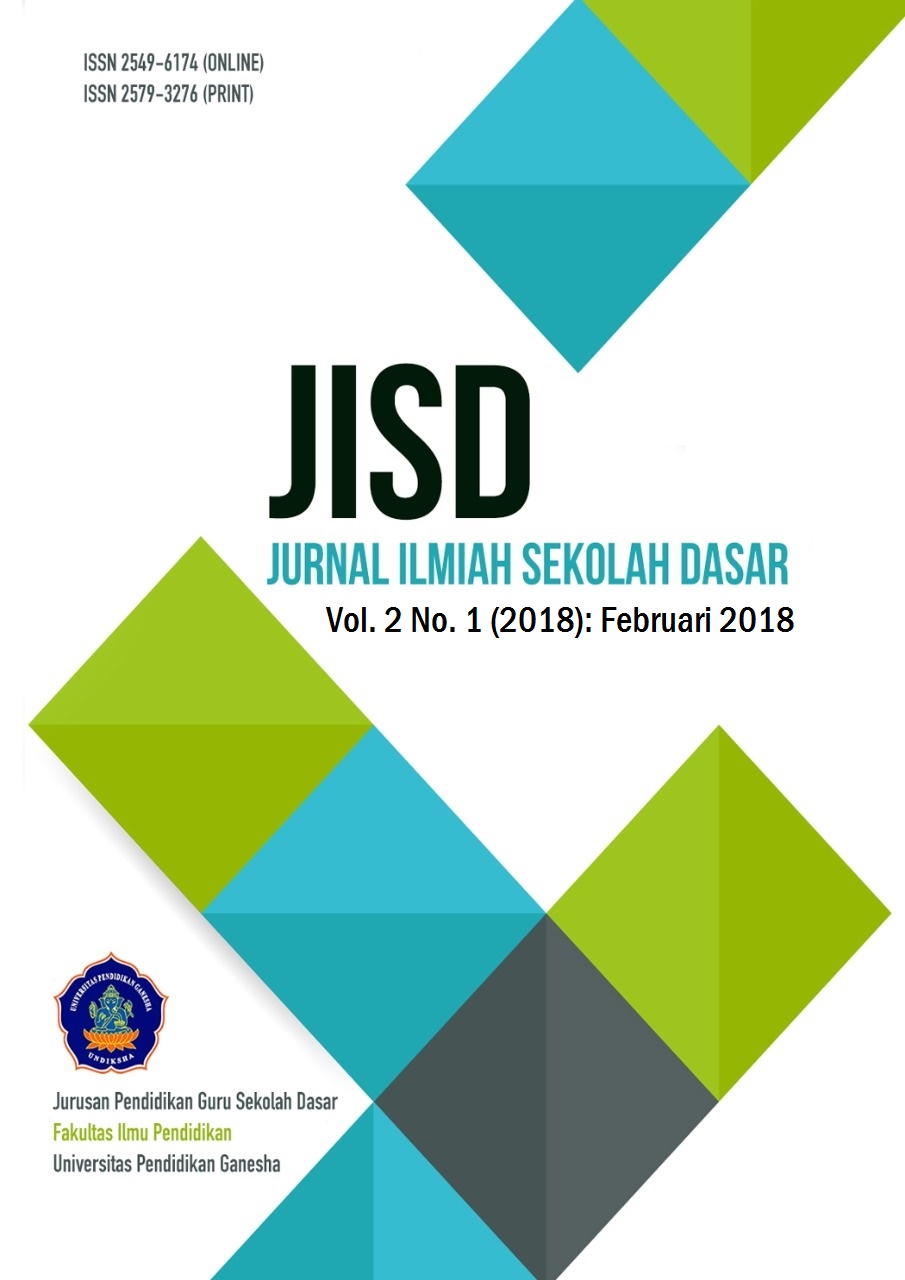Pengaruh Model Pembelajaran Role Playing Berbasis Tri Hita Karana Terhadap Kompetensi Pengetahuan IPS Siswa Kelas IV SD Gugus Untung Surapati
DOI:
https://doi.org/10.23887/jisd.v2i1.13894Abstrak
This research aims to determine the significant differences in the competence of IPS group knowledge of students who are taught by role playing learning model based on Tri Hita Karana. This research type is quasi experiment research with nonequivalent control group design. Samples were taken by random sampling technique. The sample in this research is the fourth grade students of SDN 6 Sumerta amounting to 39 students as the group which is recommended with the role playing model based on Tri Hita Karana and the fourth grade students of SDN 11 Sumerta are 38 students as control group with conventional learning. The data collection is done by using the test method in the form of the usual double choice objective test with four answers. The data obtained were analyzed using t-test analysis. The result of data analysis is tvalue = 8,315> ttable = 2,000 for 5% significance and dk = 75. Based on test criteria, H0 is rejected. The average score of IPS knowledge competence in the group that was studied with the role playing model based on Tri Hita Karana was X = 84,31, while in the group recommended with conventional learning was X = 69,11. Based on the result of this research, it can be concluded that there is influence of role playing model based on Tri Hita Karana on the competence of IPS knowledge of fourth grade students of SD Untung Surapati Unit, Denpasara Timur Sub District, Lesson Year 2016/2017. concluded that the model of learning group investigastion affect learning outcomes Civics class VI students of SD N 2 Datah regency of Karangasem.Referensi
Agung, A.A Gede. 2014. Metodologi Penelitian Pendidikan. Singaraja : Aditya Media Publishing.
Arikunto, Suharsimi. 2010. Prosedur Penelitian . Jakarta : PT Rineka Cipta.
Dantes, Nyoman. 2012. Metode Penelitian. Yogyakarta : CV Andi Offset.
Depdiknas. 2006. Badan Standar Nasional Pendidikan (BNSP) Untuk Satuan Pendidikan Dasar. Jakarta. Depdiknas.
Huda, Miftahul. 2015. Model-Model Pengajaran Dan Pembelajaran. Yogyakarta : Pustaka Pelajar.
Kosasih. 2014. Strategi Belajar dan Pembelajaran Implementasi Kurikulum 2013. Bandung : Yrama Widya.
Kurniasih, Imas dan Berlin Sani. 2015. Model Pembelajaran. Kata Pena CV Solusi Distribusi
Marjan, Johari. 2014. ”Pengaruh Pendekatan Saintifik Terhadap Hasil Belajar Biologi Dan Keterampilan Proses Sains Siswa Ma Mu’allimat Nw Pancor Selong Kabupaten Lombok Timur Nusa Tenggara Barat”. Jurnal Pendidikan dan Pengajaran. Volume 4 Edisi Mei, (hlm.1-12)
Sanjaya, Wina. 2013. Penelitian Pendidikan Jenis, Metode, dan Prosedur. Jakarta : Kencana Prenada Media Group.
Setyosari, Punaji. 2013. Metode Penelitian Pendidikan dan Pengembangan. Jakarta : Kencana Prenada Media Group.
Setyosari, Punaji. 2015. Metode Penelitian Pendidikan dan Pengembangan. Jakarta : Kencana Prenada Media Group.
Sugiyono. 2014. Metode Penelitian Kuantitatif Kualitatif Dan R&D. Bandung : Alfabeta.
Sukreni, Ni Nyoman. 2014. ”Pengaruh Model Pembelajaran Role Playing Berbasis.
Sumayasa, Nyoman. 2015. ”Pengaruh Implementasi Pendekatan Saintifik Terhadap Motivasi Belajar Dan Hasil Belajar Bahasa Indonesia Pada Siswa Kelas VI Di Sekolah Dasar Se Gugus VI Kecamatan Abang, Karangasem” Jurnal Pendidikan Dan Pengajaran. Volume 5, (hlm.1-6)
Undang-Undang Republik Indonesia No. 20 Tahun 2003 tentang Sistem Pendidikan Nasional. 2003. Jakarta.
Wartini, Ida Ayu Km Mirah. 2014. ”Pengaruh Implementasi Pendekatan Saintifik Terhadap Sikap Sosial Dan Hasil Belajar PKn Di Kelas VI SD Jemabatan Budaya, Kuta” Jurnal Pendidikan dan Pengajaran. Volume 4, (hlm.1-11).
Wirawan, Adi. 2011. Tri Hita Karana. Denpasar : Paramita. Penilaian Kinerja Terhadap Keterampilan Berbicara Pada Pelajaran Bahasa Indonesia Siswa Kelas V SD”. Jurnal Pendidikan dan Pengajaran. Volume 2, Nomor 1, (hal. 1-10)
Unduhan
Diterbitkan
Cara Mengutip
Terbitan
Bagian
Lisensi
Authors who publish with the Journal Ilmiah Sekolah Dasar agree to the following terms:
- Authors retain copyright and grant the journal the right of first publication with the work simultaneously licensed under a Creative Commons Attribution License (CC BY-SA 4.0) that allows others to share the work with an acknowledgment of the work's authorship and initial publication in this journal.
- Authors are able to enter into separate, additional contractual arrangements for the non-exclusive distribution of the journal's published version of the work (e.g., post it to an institutional repository or publish it in a book), with an acknowledgment of its initial publication in this journal.
- Authors are permitted and encouraged to post their work online (e.g., in institutional repositories or on their website) prior to and during the submission process, as it can lead to productive exchanges, as well as earlier and greater citation of published work. (See The Effect of Open Access)











